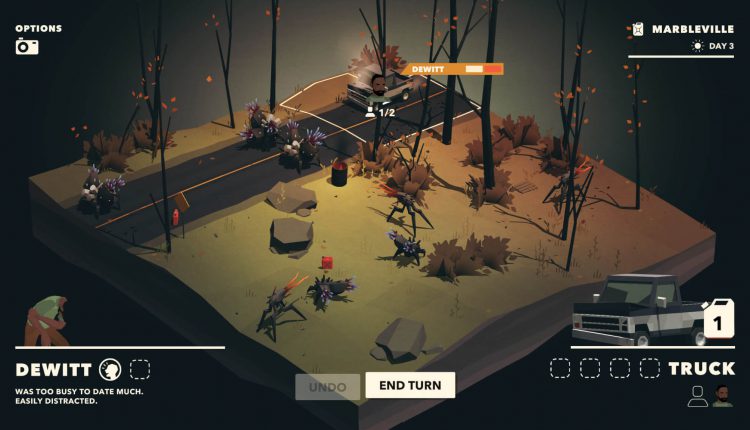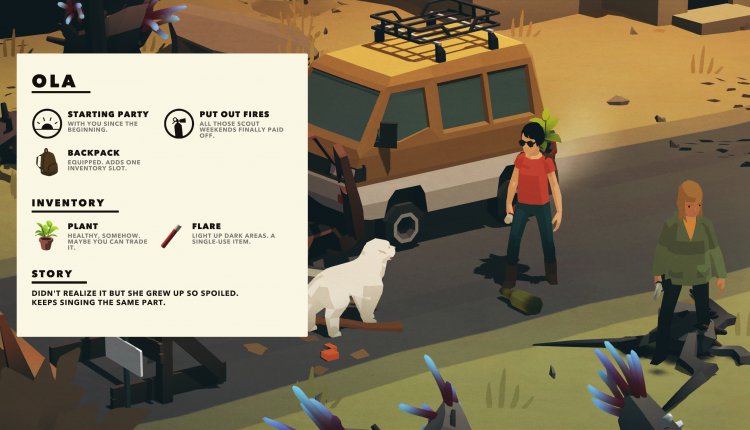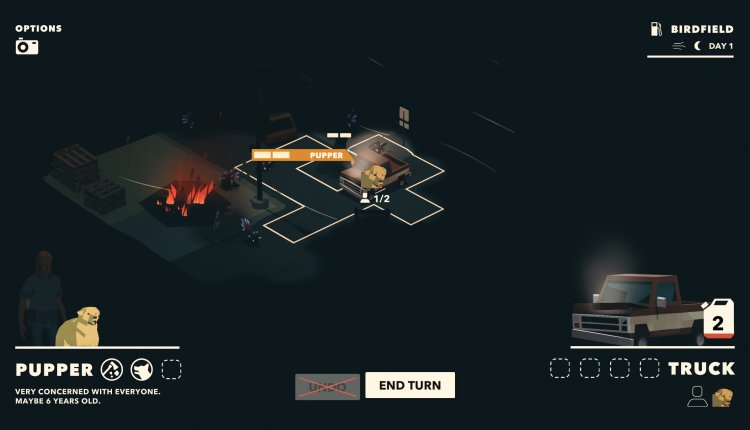Overland — Go west young pup
Overland is a turn-based roguelike that casts you as a survivor on a more-often-than-not doomed road trip through a devastated American wasteland. Driving from the East Coast to the West, you must scavenge for supplies, invite other survivors to join you, and plot a safe route to the next point on the map.
Traversing points on the map is no cakewalk. Gasoline is scarce, and while it can be siphoned out of abandoned vehicles and occasionally taken from ruined gas stations there is an even bigger problem. You guessed it! Aliens. The good ol’ USA has been overrun with ‘em, the hostile kind that burrow up from the ground, react to noise, and pack a deadly melee punch. They’re everywhere and they want to kill you before you can escape.
Much like fellow-roguelike Into the Breach, each stage in Overland takes place on a square piece of suspended earth. You drive into the stage and then plot out the best sequence of actions that will take you to the next square with as little damage as possible. There are often wrecks of cars or dumpsters to rummage through, occasional gas containers and medkits to pick up, as well as bottles, flares, knives and other items that can be used as weapons against the aliens who populate the map in greater or lesser numbers and variety depending on how far west you’ve driven.
Occasionally you’ll spot another wandering survivor, another human or a dog. If you’ve enough seats in your current vehicle you can invite them to join you and if they accept they will be added to your party. Safety in numbers, right? If you spot a new ride changing vehicles is also an option. This is useful because vehicles are fairly destructible and you might find yourself jumping into whatever vehicle is closest in order to survive.
After a stage is cleared, you and your party relax on the roadside and look at the map to plan your next move. You can choose to go straight ahead, as far as your tank of gas will take you, or to stop off at one of several detours where there are rumored to be supplies, tools, people who need help, or more precious gasoline. The map shows you the distance remaining in the current chapter, of which there are seven. One nice thing about Overland is that once you reach the end of one chapter you have the option to begin there on your next run. Meaning you don’t always have to start over at the beginning. A bad thing, however, is that unfortunately this doesn’t really make much of a difference.

To be honest, I haven’t enjoyed my time playing Overland. But before explaining why you too might find it incredibly frustrating, here are some things about the game that are excellent.
Overland’s visual look is low-key gorgeous. It has an incredibly memorable, understated style. Everything from the color pallete to the shapes and shading looks fantastic. The items, the characters, the environments, the geological spines poking off the aliens’ shells–it all looks great and highly polished. Adding to this is a very clean and pleasing menu and UI design.
The game offers a very cool dyslexic font that can make reading text easier (something I have never heard of before). The atmospheric sound design and music are perfect, conveying a mix of creepy, menacing uncertainty and dusty, open road, blue-jeans Americana. Characters and items both feature concise and humorous flavor text that gives a wry personality to the world. I once played as a character named Melvin. His description read, “Started six companies. Sort of. Just wants a hot Shower.” This dry delivery lightens up a very dark game.

But for me, these elements do not save Overland from being a chore to play. Not only is the game dark, but it is also punishingly difficult. I don’t mean the kind of difficult that comes from challenging puzzles or highly intelligent opponents. No. I mean the kind of arbitrary arbitrary difficulty that seems designed to punish you again and again for doing what it deems the wrong thing.
I am always happy to play a roguelike. I enjoy learning how they work and trying to use the information learned from previous mistakes to go farther than the last time on each successive run. But that joy was completely missing in my time spent with Overland. Once you get past the way the game looks and sounds you will find some deeply odd design decisions.
For example, this is a survival game where your human characters can only pick up one item at a time, despite having two hands. Want to pick up a knife and a bottle? Sorry, wrong game. Want to take out that enemy behind you? You can’t. Your car cannot be put in reverse and moved back more than one square. The game gives you (at times) a dog and a pickup truck but your dog cannot jump into the back of your pickup truck if you already have a second person in your party. Cars can only take two hits before they explode. Fair enough. How destructive is running over a traffic cone, you ask? I did this and my vehicle was suddenly in flames. It can also be very hard to tell what enemies actually do until they attack, or explode, leaving you to start over.

Over and over again the game will impress upon you that it is very difficult and you are not making the right choices. OK, I said to myself. I’m tough, I can take it. But as you play and play the game gives you virtually no rewards for making it further. It’s just more of the same punishing landscape, more gas cans to hunt down. Eventually you might reach a shop where you can barter for some new items, but this wasn’t enough for me.
In the end, Overland doesn’t offer enough interesting choices to be fun. What it did offer was the chance to play a repetitive scenario again and again with few rewards and many puzzling arbitrary constraints. I am aware that the developers continue to work on and patch the game, and that is commendable. But with so many options out there I have no hesitation about recommending that roguelike or strategy lovers keep on rolling down the road and look for a different route.
Overland is available now on PC, PS4, Xbox One and on iOS via Apple Arcade.
Comments are closed.